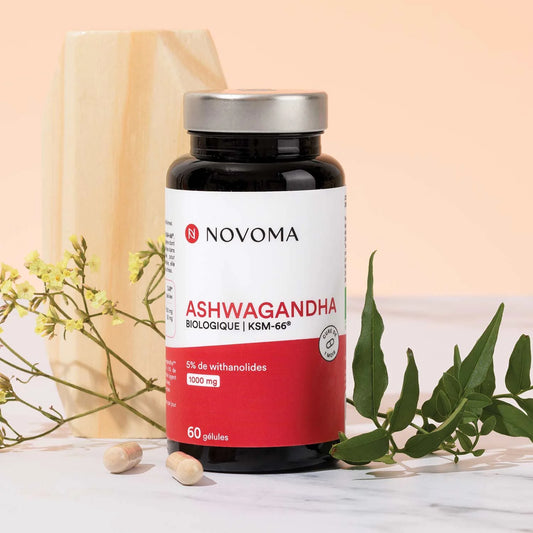
How long does it take for an ashwagandha treatment to start having effects?
Summary
Ashwagandha is one of the most popular adaptogenic herbs of recent years. A star among natural extracts, this plant, used for thousands of years in Indian pharmacopoeia, has much to offer and is now a popular supplement for its boosting effect on the body and overall well-being.
Ashwagandha helps maintain mental and emotional balance, supports intellectual functions, fights stress and fatigue... not to mention its benefits on tone and immune defenses!
But when we talk about benefits, ONE question arises (and our customers are the first to tell us about it ): "How long does it take to feel the effects of Ashwagandha? " 🤔
👉 If you've started your treatment or are about to start it, it's important to know what to expect and what types of effects you'll experience! Here's everything you need to know about Ashwagandha, its mechanism and scope of action, and how long it takes to see concrete results.
What is ashwagandha and how does it work on the body?
Before going into detail on the mechanism of Ashwagandha and its effects over time, a short review of its origin and its recognized benefits is necessary!

Definition and origin of a plant with a thousand virtues
Ashwagandha is a plant native to India and has been used in Ayurvedic medicine for over 3,000 years. It's also known as "Indian ginseng," although technically it has nothing to do with ginseng!
💡 Good to know:
Ginseng comes mainly from Asia (Asian ginseng or Panax ginseng) and North America (Panax quinquefolius) . Only the roots of plants over four years old are ground and concocted to take advantage of their energetic and toning properties. Its use in traditional Chinese medicine dates back more than 2,000 years.
While Ashwagandha (Withania somnifera) , a plant from the Solanaceae family, comes from Ayurvedic medicine. It has been used for over 3,000 years for its benefits, particularly on the immune system and mental balance .
The species name - somnifera - is said to have been coined based on its popular use to "induce sleep." Logical, you might say!
Only the root (“ Mula ” in Sanskrit) is used in various preparations, the first traces of which appear in two collections from the Vedic period in the 6th and 7th centuries BC. But regardless of the name, this plant has built a solid reputation thanks to its virtues on stress regulation, energy and mental balance.
👉 What about the term "adaptogen" ? This term refers to plants and natural extracts that help the body adapt to different forms of anxiety, whether physical, mental, or emotional. Simply put: Ashwagandha acts as a shield to protect against the harmful effects of stress and promotes the body's natural resistance.
Nothing magical here: its gentle and progressive action on the nervous and endocrine systems makes it extremely valuable.
Recognized benefits of Ashwagandha and scientific research
While Ashwagandha has long been a part of traditional Ayurvedic recipes, it has benefited for several years from solid scientific research attesting to its multiple benefits for the body.
The effects of Ashwagandha result from its composition, and different phytochemical studies have highlighted the presence of antioxidant and anti-inflammatory molecules , such as:
- 👉 Phenolic acids and flavonoids: powerful anti-inflammatories and antioxidants;
- 👉 Alkaloids, including whitanine, somniferine, anaferine, tropine, which affect the nervous system and stress regulation;
- 👉 Tannins and saponins, with hypocholesterolemic and hepatoprotective properties.
These same compounds also act on the regulation of blood sugar and the proper functioning of hormones .
It is credited with anti-stress effects , but not only that! In addition to its relaxing action, this plant strengthens the immune system, improves cognitive performance and supports physical vitality .
These benefits depend on the quality of the supplement you choose, the regularity of your intake and the initial state of the body (lifestyle, diet, etc.).
Before you start shouting about miracles, you need to understand how it works and adjust your expectations. Ashwagandha can work wonders, but under certain conditions! 😉

What factors influence the time it takes to benefit from the effects of Ashwagandha?
The time it takes to see the effects of Ashwagandha depends on several factors: dosage, form, regularity of intake, not to mention the initial state of your body and nervous system!
Explanations. 👇
Form and dosage of the treatment consumed
If you're hoping to feel the first effects of Ashwagandha quickly, the dosage and form you choose will have the most impact.
Which form should you choose?
Ashwagandha traditionally comes in powder form, once the root is ground and dried. It is also available in capsules, liquid extract, or more rarely in the form of a mother tincture.
👉 Standardized Ashwagandha extracts, containing a high concentration of withanolides, are often more effective, allowing you to feel the benefits more quickly. The capsule form is ideal (and accessible) to ensure a consistent and sufficient dose with each dose.
Although extracts standardized to 30% withanolides are available on the market, we opted for an extract standardized to 5% to maximize the benefits while minimizing the risk of side effects.
Indeed, excessively high concentrations can cause adverse effects, which is not the case with a 5% formulation. Thus, this choice allows for a combination of efficacy and safety.
What dosage should I choose?
📈 The recommendations resulting from the results of the international working group created by the World Federation of Societies of Biological Psychiatry (WFSBP) and the Canadian Network for Mood and Anxiety Treatment (CANMAT) are as follows: a daily intake of 300 to 600 mg of concentrated Ashwagandha extract is optimal to observe concrete results.
👉 In terms of scientific evidence, this plant is working : a randomized study was conducted in India on 130 men and women . Half took a placebo, the other half took withanolides per 300 mg daily capsule. Participants who consumed Ashwagandha extract reported improvements in their stress levels and sleep quality, but also psychological well-being, and better memory and concentration abilities.
A 2021 scientific review compiled five studies on the use of ashwagandha to promote sleep (doses ranging from 250 to 600 mg/day in the form of KSM-66 root extract). All five studies revealed significant sleep-improving effects compared to placebo. The benefits were greatest at 600 mg/day, over a two-month course.
👉 If you opt for lower doses or more "raw" forms of this plant, expect a more subtle and gradual effect!
Consistency and regularity in taking
As with any healthy lifestyle habit, consistency is key! Taking Ashwagandha every other day or sporadically may delay or even cancel out the expected benefits.
☝️ Our advice : make sure to take your treatment at the same time during a meal to ensure optimal absorption and continued action. The effects of Ashwagandha are not immediate; this plant works deep down to rebalance your system!
Initial state of the organism: physical and emotional conditions
Note that the state of your body directly influences the time it takes for the effects of Ashwagandha to appear , like other adaptogenic plants! The more stressed, tired or emotionally weakened you are, the more quickly the effects will be felt.
👉 Why ? Because your body, when in distress, is more receptive to any intervention that provides relief, even subtle ones.
However, if you're already relatively fit and looking to fine-tune your physical or mental performance, it might take a little longer for the effects of Ashwagandha to manifest.
We recommend you
Organic Ashwagandha
Formulated with patented KSM-66® pure organic Ashwagandha root extract.
- ✅ Patented KSM-66®
- ✅ 500 mg of ashwagandha per capsule
- ✅ 5% withanolides
- ✅ Certified Organic by Ecocert
How long does it take to feel the effects of Ashwagandha?
The concrete effects of Ashwagandha vary in the short, medium, and long term. Here are the details of the signs you may observe.
Short-term effects: from the first days
In some people, especially in cases of constant stress and increased nervousness, it is possible to feel the first effects in just a few days.
👉 These early signs may include a slight feeling of relaxation, a slightly deeper sleep, and some reduction in nervous tension.
Ashwagandha works gently but surely, preparing your body for the profound benefits to come!
Medium-term effects: between 2 and 4 weeks
It is generally after 2 to 4 weeks that one begins to feel the most noticeable effects of an Ashwagandha cure.
👉 At this stage, most people taking a course report improved stress resistance, improved concentration, and a significant reduction in fatigue.
Are you a fan of emotional rollercoasters and the alternation between energy spikes and intergalactic fatigue? Ashwagandha helps mitigate these fluctuations, support the body's natural homeostasis, and regain vitality.
From the second week of treatment, you should observe a progressive improvement in your energy and more restorative and deep sleep .
In short, you go from a half-empty battery to a full charge! ✌️
Long-term effects: beyond 4 weeks
By being patient and consistent in your treatment, the long-term effects of ashwagandha will delight you!
👉 After four weeks, the benefits stabilize, particularly with regard to stress regulation and cognitive abilities . After the first month of regular use, Ashwagandha will have helped your nervous system regain a certain balance and you will be more resilient to the hazards of everyday life.
How can you see it? Your energy level is more consistent, you're better able to stay calm in the face of minor setbacks, and you sleep more soundly!

Top Tips for an Effective Ashwagandha Treatment
Now that the topic of how long it takes for ashwagandha's effects to take effect has been thoroughly addressed, here's some advice on how to optimize their onset. Following a course of treatment is fine, but choosing the best one and doing it right is even better! Stay a while, we'll show you.👇
Choosing a quality supplement: a composition under the microscope
As with any dietary supplement, and even more so when it comes to plant extracts: the choice of product is crucial to ensure concrete effects in complete safety!
✅ Choose an ashwagandha treatment with a standardized withanolide content: this guarantees you will obtain an optimal concentration of active ingredients;
✅ Choose a product with impeccable traceability and composition: organic certification is an additional guarantee of the absence of pesticides or unwanted chemical residues;
✅ Choose a supplement with a quality label: KSM-66-labeled ashwagandha benefits from solid clinical studies and 14 years of R&D, particularly on its benefits in reducing anxiety . It is currently the extract with the best concentration on the market;
✅ Check out customer reviews and testimonials: the best ambassadors for a product are its users!
The better quality your supplement, the faster and longer you will be able to feel the effects!
Good news, Novoma Organic Ashwagandha KSM-66® ticks all the boxes. 😌
What our customers notice: a decrease in stress levels and a boost in energy for 74% and 81% of them, after one month (test carried out on a panel of 42 people among our ambassadors).
Adopt a regular routine
Ashwagandha loves consistency! To maximize its effects, take it at the same time every day, preferably with a meal to facilitate absorption.
👉 Rather at the start of the day if you are looking for an energy boost;
👉 Preferably at the end of the day if your goal is focused on your quality of sleep
Establish a balanced and restorative lifestyle
Ashwagandha will be a great ally, especially if you establish certain habits and routines.
Here's how to maximize the benefits of your treatment:
✔️ Fill up on nutrients with a balanced and seasonal diet : whole grains (rich in tryptophan, the star amino acid for sleep), dark chocolate, vegetables rich in magnesium (spinach, chard, potatoes)
✔️ Go to bed at a regular time : if possible before midnight, avoiding the blue light from screens one hour before going to sleep
✔️ Opt for suitable physical activities without excess , incorporating practices that promote stress reduction: such as yoga (which can be intense in muscular terms) , or Pilates ;
✔️ Supplement your treatment with minerals and vitamins : certain nutrients promote nervous system regulation and affect stress levels, such as Magnesium Bisglycinate and Omega 3 Epax®. Knowing that the majority of French people have insufficient intake, you might as well put all the odds in your favor!
Also consider spirulina, an essential superfood to boost your energy and immune defenses!
Like all adaptogenic plants ( maca , ginseng, griffonia) , Ashwagandha is a boost to your well-being. And that's a beautiful thing!
Consult a healthcare professional
If you have any doubts about your condition or if other signs of fatigue suggest a particular condition, do not hesitate to consult a healthcare professional.
This is especially true if you are taking medication: an informed opinion will help you confirm whether this plant is suitable for you, particularly because of its action on regulating blood sugar and blood pressure.
👉 Please note: pregnancy and breastfeeding are two periods during which ashwagandha is not recommended!
Ashwagandha is a plant with multiple effects that works deeply, and requires patience and consistency to achieve its full potential. With a little consistency, you can enjoy tangible improvements in your physical and mental well-being in the medium and long term. Patience is the mother of safety!





























